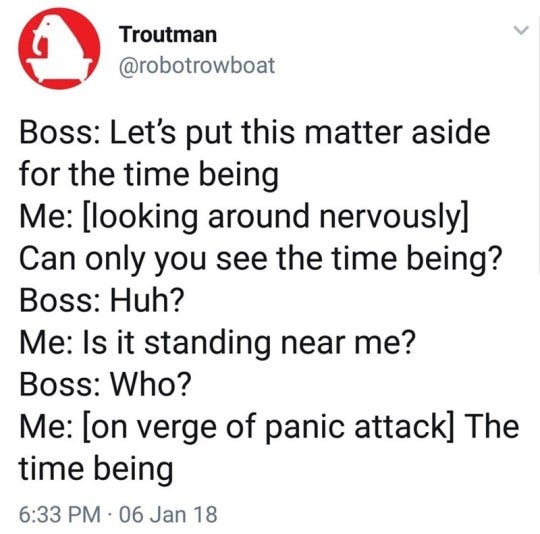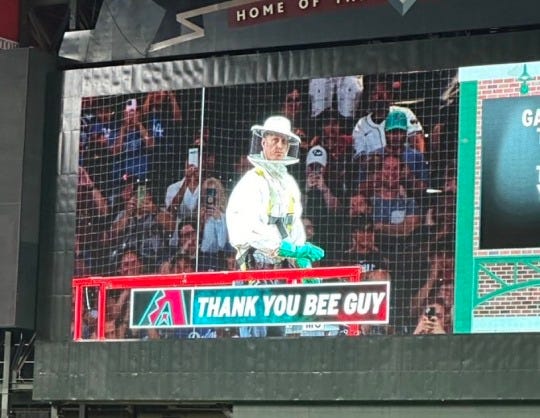Hi all! I’ll get to the question(s) of the week in a minute, but I wanted to talk a little bit about a book I just read, Cal Newport’s Slow Productivity: The Lost Art of Accomplishment Without Burnout. I’ve been a reader of his blog for many years, and have always thought that he gave the kind of no-nonsense advice that took into account modern circumstances and the demands of the attention economy. In this latest effort, his advice isn’t wrong, per se, but it’s definitely geared at someone further along in their career. Basically, in his latest book, he advocates for a lot of sensible strategies to put boundaries on busywork and overwork, and puts forward suggestions on how you could arrange your work life and personal life to maximize creativity and productivity. He encourages the reader to take the decade view, instead of the immediate view—especially for “knowledge workers” like scientists, writers, artists, and the like.
I don’t really take any issue with that advice. My feelings of discontent with the book are with his assumption of a basic level of privilege—it’s one thing to suggest paying someone to take care of your laundry and clean your house if you actually have the money to do it, but if a source of burnout and stress is that you don’t have that money it’s harder to swallow. And many of his historical examples of people who ruthlessly arranged their own lives to maximize creativity are laughably unrelatable. I love her work, but Edith Wharton dropping completed pages to the ground for a maid to pick up as she writes from her bed is not a helpful example.
And of course Newport acknowledges this, for the most part. It doesn’t help that books about creativity and productivity have always used this kind of example, so why wouldn’t he? Of course John McPhee spending two weeks at his country home on top of a picnic table looking up at the sky sounds like a super romantic way to write one of the most lauded New Yorker articles of the last century, but I can’t help but wonder who was doing his laundry and raising his kids during all this pondering?
I guess that’s my issue: Newport gives short shrift to the systemic problems facing the modern knowledge worker, the impossible dynamics we’ve been placed into in our households and relationships in the last decade and a half of technological progress. In his mind, a firmer boundary, a better schedule, a more dedicated defense of your own personal time is a surefire way to produce better work. Our lack of time in this worldview is our own fault, and not the grinding stress of modern life.
In his acknowledgments, he thanks his wife for putting up with him over eight books.
WHAT I’M READING
Slow Productivity was my train read this week, since I got it from Libby, and elsewhere I’ve been alternating between a reread of Thea Guanzon’s The Hurricane Wars and Vol. 1 of Lady Joker by Kaoru Takamura (trans. by Allison Rankin Powell & Marie Iida.) They’re both very good. Hurricane Wars has the kind of overwhelming world building that sometimes turns me off, but it’s so lush and politically tangled that I don’t mind that it’s the slowest burn of all time and also that everyone has four names. (I got through The Untamed, this is child’s play.) Lady Joker I’m reading in drips and drops. It follows a group of men in Japan who have been deeply affected by the war and the postwar economic recovery—drawn together by their shared disgruntlement they hatch a plan to kidnap the son of a CEO who once employed them all. It’s very tense, but almost contemplative in its tension; a lot of page time is given over to memory and regret. Can’t wait to finish the duology.
QUESTION(S) OF THE WEEK
When a writer signs with an agent, is there a contract for literary representation? Are there standard terms and/or red flags writers should look for?
There is! It’s called an agency agreement. Before you sign anything, I recommend you familiarize yourself with the AALA (Association of American Literary Agents)’s Canon of Ethics and the Author’s Guild guide to agency agreements. It’s from 2018 but I don’t think the information will have changed that much. I will also point you towards Jennifer Laughran’s excellent Ask The Agent post on this from 2022.
In its most basic terms, it’s an agreement, not a contract. You sign a contract with the publisher because that relationship, barring disaster, will be much, much longer—think life of the author + 72 years. The agency agreement should:
Lay out exactly what the agent will do for the client (what projects they’ll rep and how they’ll do that)
List commission rates, aka how much the agent can earn from their work; it should also authorize the agency to accept funds on the client’s behalf and lay out an industry-standard timeline for those funds to flow to the client
The mechanisms by which both clients can break the agreement and the circumstances under which both parties would be in breach.
It should lay out the “construction” of the agreement, aka what laws it was constructed under
Ultimately, it should lay out how a dispute will be managed should there be one
One thing I’d like to point out that people might not know is that publishing contracts don’t move with authors—that is to say, if you sign a contract with Penguin Random House for your book, even if you move agencies, you are a) still bound by the terms of that contract and b) your former agency is still the agency of record for that contract. So your new agent will be able to weigh in and help with matters (i.e. talking with your editors, etc.) but won’t be monetarily benefitting. In some cases, it’s possible to reassign contracts to new agencies, but that’s something that the agencies have to work out among themselves.
The agreement will probably look very short, in contrast to a publishing contract, and will hopefully be written in plain enough English that you won’t need a lawyer to look at it. These are designed to be flexible—the agent/client relationship can change over time, and as your career changes and fluctuates you may need different things from an agent and thus be looking to switch agencies.
In terms of red flags, anything that obligates you to any kind of up-front payment is a huge honking red flag. Money flows TO the author, not away—an agent should not obligate you to pay them any kind of reading fee, management fee, or any other kind of payment in order to represent your rights.
Is it frowned upon for a writer to send an updated version of their full manuscript to an agent or Big 5 editor (who accepts unagented submissions from pitching writers at conferences) several weeks into submission?
Yes! This is annoying, please don’t do it! I’m specifically referring to the scenario in which an agent or editor has requested your manuscript and is theoretically already reading. All this tells me is that you either a) sent something off half-baked or b) are indecisive and unable to stop fiddling, which just tells me you’re impatient. Publishing is such a long game—you have to be able to wait.
If, however, you have only queried the manuscript, and have, perhaps, received editorial advice from another agent or editor, it’s perfectly all right when an agent requests it to say “Yes, of course, but I have received some edits from XYZ and am in the middle of a revision. Would you like to see the original version, or may I send you the updated version when it’s done in X time period?” We’ll almost always say yes.
THIS WEEK IN HOCKEY
In news that shocks absolutely no one, the Washington Capitals were swept by the top-seeded Rangers in four, meaning their playoff dreams are effectively done for the forseeable future. They’re an old team; Alexander Ovechkin is thirty-eight and it’s a miracle he hasn’t sustained any long-term injuries. (Look at Sidney Crosby over there, who has barely played a full season in his entire career.) TJ Oshie apparently spent Game 4 with a broken hand; he gave a very depressing talk to the press on locker clean-out, saying if he can’t figure out his recurrent back problems he might have to retire. (TJ: Retire! You’ve had like six concussions! Your dad has CTE-related early-onset dementia! Go play with your kids!) There are only two upsides to the Capitals’ embarassing early exit: first, their chances at the draft are improved by virtue of having been terrible this season, and second, all the infants on the team can now be sent down to the Hershey Bears to hopefully lead them to another AHL Calder Cup.
HOUSEKEEPING
Do you have any questions about the publishing industry? Requests for advice? Thoughts on your recent reads? You can leave them as comments, replies to this email, or fill out this Google form to ask anonymously!
I am open to queries via QueryManager only, which can be found here. Here is my submissions page on the LDLA website, and here is a more detailed MSWL.
My first novel, Marrying In, is available for purchase on Kindle, Nook, and Kobo, and is coming soon to iBooks. If you’ve read it, consider leaving a review—that helps me and the book in the long run!
You can find me on social media on Bluesky, Twitter, Instagram, the A Faster No Discord, and now TikTok. If you buy any of the books linked in this newsletter I receive a small commission at no cost to you.
This newsletter is a personal project, and the sentiments and opinions expressed here are my own and not those of my employer.





This review of the Newport book took it straight off my TBR — thank you 🙃